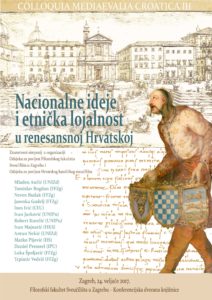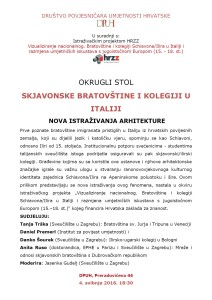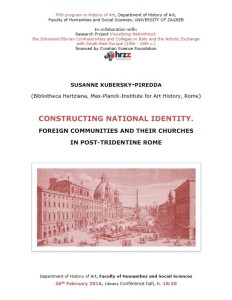Faculty of Humanities and Social Sciences, University of Zagreb
30-31 May 2017
The conference aims at interdisciplinary perspective on images related to Schiavoni/Illyrian confraternities in Early Modern Italy. It explores both visual and linguistic constructs produced or commissioned by members of Schiavoni/Illyrian institutions, questioning intentions and mechanisms behind their creation, as well as the reverberation of their meaning in different contexts. These phenomena are also regarded in comparative perspective of similar expressions found in “proto-national” institutions of other foreign communities on the Apennine peninsula in the same period. The conference will bring together scholars working in the fields of art history, history, visual, literary and material culture studies, thus broadening the existing understanding of Schiavoni/Illyrian proto-national identity.
Programme
Leaflet
Book of abstracts
 Colloquia Mediaevalia Croatica III: Nacionalne ideje i etnička lojalnost u renesansnoj Hrvatskoj / National Ideas and Ethnic Loyalties in Renaissance Croatia
Colloquia Mediaevalia Croatica III: Nacionalne ideje i etnička lojalnost u renesansnoj Hrvatskoj / National Ideas and Ethnic Loyalties in Renaissance Croatia
Friday, 24th February 2017
Zagreb, Faculty of Humanities and Social Sciences, Library Conference Hall
Programme and Book of Abstracts
 Confraternities and Colleges of Schiavoni in Italy – New Research of Architecture
Confraternities and Colleges of Schiavoni in Italy – New Research of Architecture
(Skjavonske bratovštine i kolegiji u Italiji – nova istraživanja arhitekture)
Wednesday, 4th May 2016, 18.30
DPUH, Preradovićeva 44, Zagreb
Participants:
- Tanja Trška (University of Zagreb): Scuola di San Giorgio degli Schiavoni in Venice
- Daniel Premerl (Institute of Art History) and Danko Šourek (University of Zagreb): The Illyrian-Hungarian College in Bologna
- Anita Ruso (PhD candidate, EPHE Paris and University of Zagreb): Networks and Relations between the Schiavoni Confraternities and the Republic of Ragusa
Moderator: Jasenka Gudelj (University of Zagreb)
Continue reading Round table at Croatian Society of Art Historians →
Francesca Coltrinari
University of Macerata
The Holy House of Loreto, artistic centre and ‘Illyrian’ shrine (XV-XVI centuries)
Monday, 18th April 2016, 16.00
Faculty of Humanities and Social Sciences, University of Zagreb, Ivana Lučića 3, Library conference hall
 Susanne Kubersky-Piredda
Susanne Kubersky-Piredda
Max Planck Instutute for Art History – Bibliotheca Hertziana, Rome
CONSTRUCTING NATIONAL IDENTITY. FOREIGN COMMUNITIES AND THEIR CHURCHES IN POST-TRIDENTINE ROME
Friday, 26th February 2016, 18.30
Faculty of Humanities and Social Sciences, University of Zagreb, Ivana Lučića 3, Library conference hall
Abstract
Devotion and identity: iconography of foreign communities in Early Modern Italy
Sixteenth Century Society and Conference, Bruges, 18-20 August 2016
Processes and efforts of maintaining or constructing the cultural identity of communities considered as foreign in Early Modern Italian cities (both Italian and non-Italian minorities) frequently resulted in prominent artistic commissions conceived as expressions of individual or collective devotion, which also ensured the visibility of the “foresti” and “stranieri” within their adopted urban environments. With Venice as the most eminent example, the multicultural host societies generally sustained these immigrant communities by providing the social framework which permitted the preservation of group identity through the establishment of colleges, confraternities or scuole. Conceived within the project “Visualizing Nationhood: the Schiavoni/Illyrian Confraternities and Colleges in Italy and the Artistic Exchange with South East Europe (15th – 18th century)”, University of Zagreb, the panel seeks to bring together case studies which explore issues of maintaining or constructing the cultural identity of immigrant communities in urban centres of Early Modern Italy, interactions and artistic exchanges between different foreign communities and possible influences of immigrant minorities on the artistic production in major Italian centres.
Topics may include but are not limited to:
- artistic commissions by members of foreign communities
- imported objects of devotion (relics, icons or other particularly venerated works of art)
- construction of identity through works of art dedicated to particular saints venerated by foreign communities
- visual narratives and their textual and/or archival sources
- choice of artist as an expression of identity
- artistic exchanges between host societies and foreign communities
- local reception and perception of works of art commissioned by foreign communities
- works of art imported from the foreign communities’ places of origin
Please submit a 250-word abstract and a one-page CV to Tanja Trska (ttrska@ffzg.hr) by 5 February 2016.
Research project financed by the Croatian Science Foundation (HRZZ)



